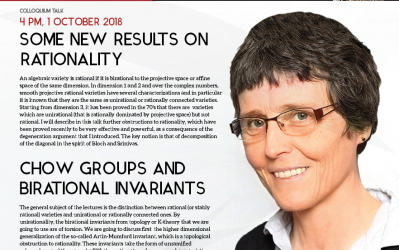Lecture 1: Some new results on rationality
Date & Time: Monday, 1 October 2018, 04:00 PM
Abstract:
An algebraic variety is rational if it is birational to the projective space or affine space of the same dimension. In dimension 1 and 2 and over the complex numbers, smooth projective rational varieties have several characterizations and in particular it is known that they are the same as unirational or rationally connected varieties. Starting from dimension 3, it has been proved in the 70's that there are varieties which are unirational (that is rationally dominated by projective space) but not rational. I will describe in this talk further obstructions to rationality, which have been proved recently to be very effective and powerful, as a consequence of the degeneration argument that I introduced. The key notion is that of decomposition of the diagonal in the spirit of Bloch and Srinivas.
Chow groups and birational invariants:
Lecture 2: Obstructions to rationality: unramified cohomology
Date & Time: Tuesday, 2 October 2018, 10:30 AM
Lecture 3: Zero-cycles and decomposition of the diagonal
Date & Time: Wednesday, 3 October 2018, 10:30 AM
Lecture 4: The degeneration method and various improvements
Date & Time: Thursday, 4 October 2018, 10:30 AM
Lecture 5: Cohomological decomposition of the diagonal in small dimension.
Date & Time: Friday, 5 October 2018, 10:30 AM
Abstract:
The general subject of the lectures is the distinction between rational (or stably rational) varieties and unirational or rationally connected ones. By unirationality, the birational invariants from topology or K-theory that we are going to use are of torsion. We are going to discuss first the higher dimensional generalization of the so-called Artin-Mumford invariant, which is a topological obstruction to rationality. These invariants take the form of unramified cohomology and they are of a \$K\$-theoretic nature. In nonzero characteristic, some other obstructions appear, like algebraic forms.
More generally, we will discuss a Chow-theoretic obstruction to (stable) rationality which comes from the birational invariance of the Chow group of zero-cycles. In geometric terms, the obstruction is related to the existence of a decomposition of the diagonal, a notion that, with rational coefficients, first appeared in the work of Bloch and Srinivas. The key point here is to work with integral coefficients. We will show that it controls many known obstructions to rationality, in particular unramified cohomology. We will then describe the degeneration method, which was first introduced by the speaker, and then improved by Colliot-Th\'el\`ene-Pirutka and Schreider. Totaro also applied it in the form of a specialization to nonzero characteristic. As a consequence of this method, we could prove that there are Fano threefolds which are not stably rational while their Artin-Mumford invariant is trivial.
We will finally discuss in dimension 3 the obstructions to the existence of a cohomological decomposition of the diagonal. It is interesting to see that the obstruction contains on one hand the Artin-Mumford invariant and on the other hand a condition that is related to the Clemens-Griffiths criterion, namely the geometry of the Intermediate Jacobian and of the Abel-Jacobi map for 1-cycles.
This lecture is part of the discussion meeting Complex Algebraic Geometry.


